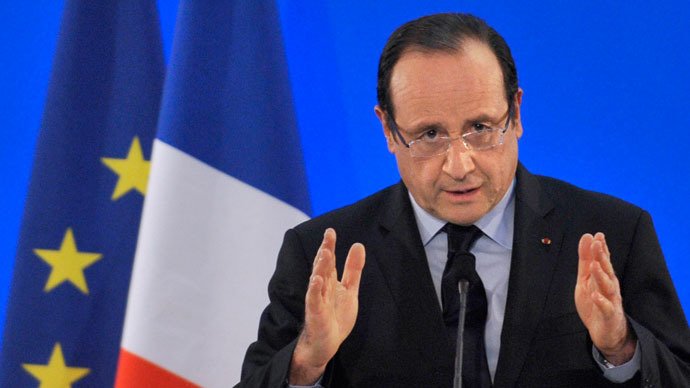‘A very unfortunate decision’: French President gets UNESCO peace prize

As French president Francois Hollande is set to receive UNESCO’s peace prize for ‘peace and stability’ in Africa, Abayomi Azikiwe, editor for Pan-African News Wire says it is an ill choice in the light of French involvement in conflict-torn Mali.
“Having assessed the dangers and the repercussions of the
situation on Africa, and on Mali in particular, the jury
appreciated the solidarity shown by France to the peoples of
Africa,” the Jury of the Félix Houphouët-Boigny Peace Prize
said in a statement on Thursday.
France started a military operation in Mali on January 11, 2013,
with the aim of the mission being the prevention of extremists from
taking control of the northern part of the African country.
However, Abayomi Azikiwe believes the mission is not humanitarian,
but fueled by economic and political interests of France, as well
as other NATO member states.
RT:Some critics are saying that Hollande is a strange
choice for peace award, as he is currently engaged in a military
conflict. Do you think he deserves the award?
Abayomi Azikiwe: I think it’s a very unfortunate decision on
the part of UNESCO to award this Félix Houphouët-Boigny Peace Prize
to Francois Hollande. The fact that he hasn’t been in office long,
his political career since being in office as president of France
has been marred by this intervention in Mali. Something that was
done unilaterally; was totally unjustified. There have been reports
of gross human rights violations that have taken place since the
French intervention in Mali.
They’ve admitted, the Defense Ministry in Paris, that they’ve
killed hundreds of people, and the operation overall is not turning
out the way that France had initially planned. There’s been intense
fighting in the city of Gao over the last two weeks. There were
reports of one of the groups that has been targeted in northern
Mali, the movement of Oneness and Jihad in West Africa has broken
through the defense lines that were set up outside the city, and
was inside the city, engaging both Malian and French military
forces. There’s also been bombing in the mountainous areas in the
north-east of Mali. These developments don’t bode well for someone
who has been offered such a prestigious award for peace.
RT:But don’t those developments bode well then for the
necessity of troops to be there in the first place?
AA: Not at all. We’ve found out that many of the allegations
that were made in the regard to the developments in Mali turned out
to be not accurate. For example, there were reports that the Ahmed
Baba institute which exists in Timbuktu, and houses tens of
thousands of ancient historical documents going back to the 13th
century in Mali, had been burnt down by the Islamists, which turned
out to be totally inaccurate. It was not burnt to the ground, the
manuscripts were not destroyed - many of them were moved to another
location. Also, reports that the Islamists would have overrun the
country if France hadn’t intervened, that still is
unsubstantiated.
The problem with intervention by France is that it is not the
intervention that is going to gain the support of people inside of
Mali and also people throughout the entire region, of West Africa
as well as North Africa.
RT:Why then do we hear these voices in Mali, “Yes, we
are happy that France is here”, “Yes, we want them here”, “Yes,
they are bringing stability”?
AA: It depends on who you’re speaking with. There are many
people there who have given interviews to the international media
despite the news blackout that’s been imposed by France in the
Malian government. Many people there are saying that there are
violations to fundamental human and civil rights that are taking
place inside the country that is actually are being fostered by the
military and the government in Paris.
And of course, this is being fueled by the economic crisis that
exists in France. They have the highest unemployment rate that
they’ve had for many years that almost 11 per cent; they have a
huge deficit which they’re trying to deal with. Hollande went to
Greece just two days ago on a state visit, and he was met by a
general strike. People in Greece are off the job because of the
austerity that’s being imposed and throughout the entire southern
and western European regions. So this intervention is not a
humanitarian one, it’s based upon the economic and political
interests of France, as well as other countries in NATO, and also
including the US as well because the US is actually transporting
troops to Mali.
The statements, views and opinions expressed in this column are solely those of the author and do not necessarily represent those of RT.












